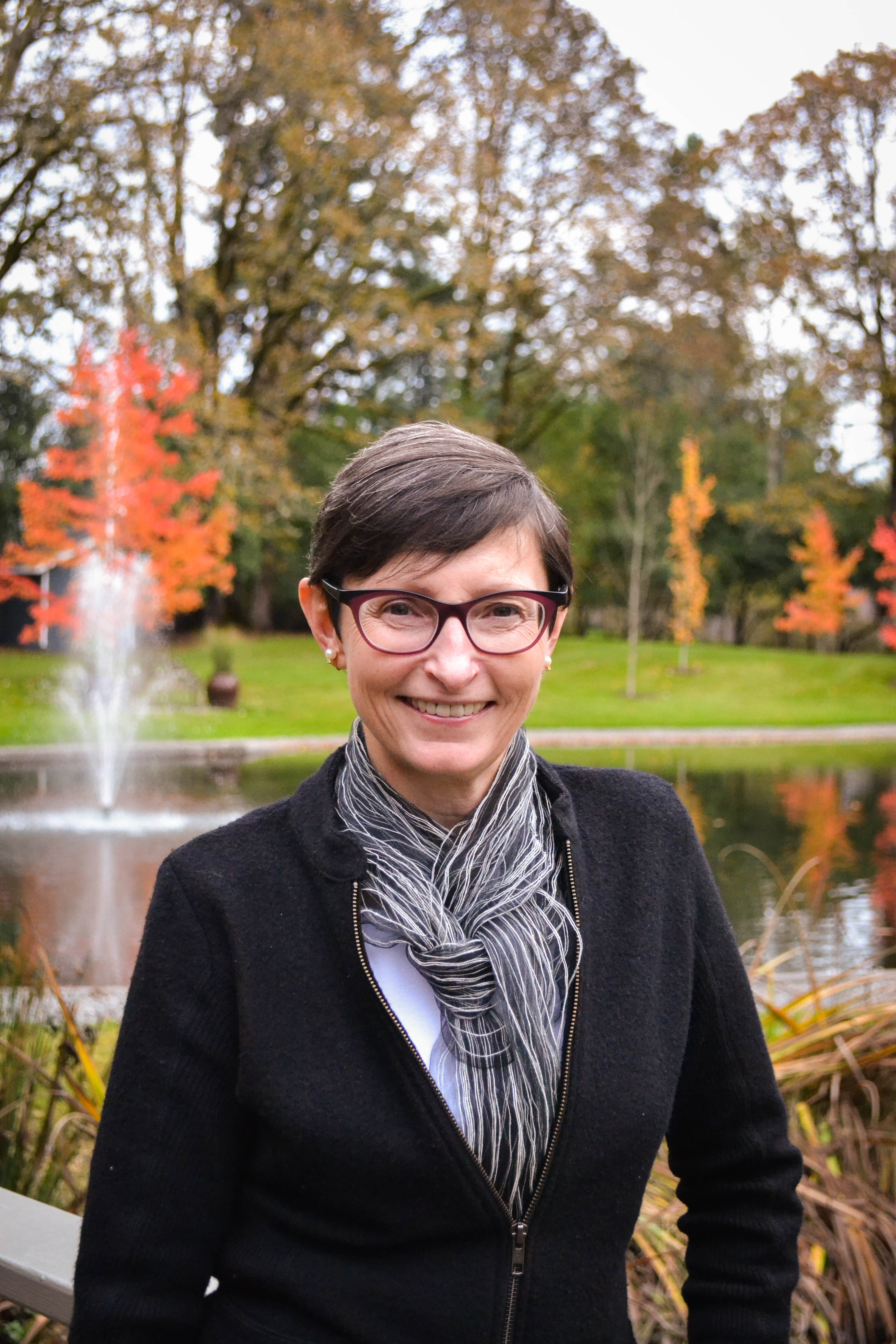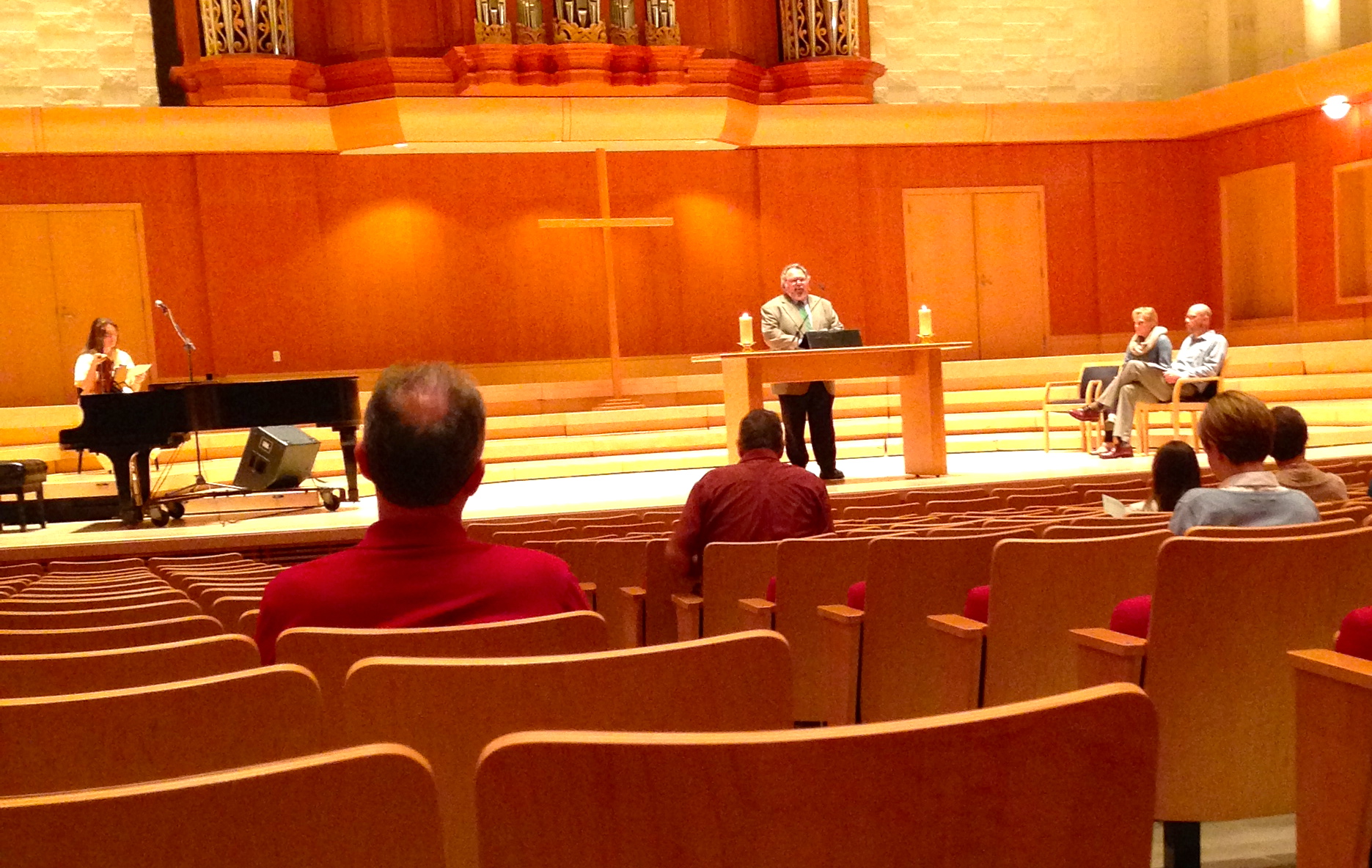By Matthew Salzano
Patty Krise leads the way into her office. As she poses for photos at her mahogany desk, she points out some details in the room.
She sits behind two computers — one for working, one for keeping her eye on other things. Sitting in front of a shelf crammed with books, there’s a Dia de los Muertos mask from when she and her husband, Pacific Lutheran University President Thomas Krise, visited the PLU gateway study away program in Oaxaca, Mexico. Under her leather desk pad, she keeps a Lutes athletics calendar.
As we leave, she spots the car I took down Spanaway Loop to Gonyea House, parked 20 yards away.
“Nice Explorer,” says Patty, a third-generation Ford employee.
Patty Krise pays attention to detail.
Whether it’s business, personal or Lute life, she doesn’t miss a beat.
At about 6 a.m., Patty starts checking her email.
She has to keep up with her Ford team in Shanghai, otherwise the time difference causes delays. When you’re a project manager and a Six Sigma black belt — which means taking a four-hour, proctored exam to be a certified leader in process improvement — you don’t let a 16-hour time difference slow you down.
She started her business career at Hanover College in Indiana, where she graduated with a bachelor’s in business. As an undergrad, she played Division III Volleyball and Basketball, missing only her senior year of basketball because of an internship.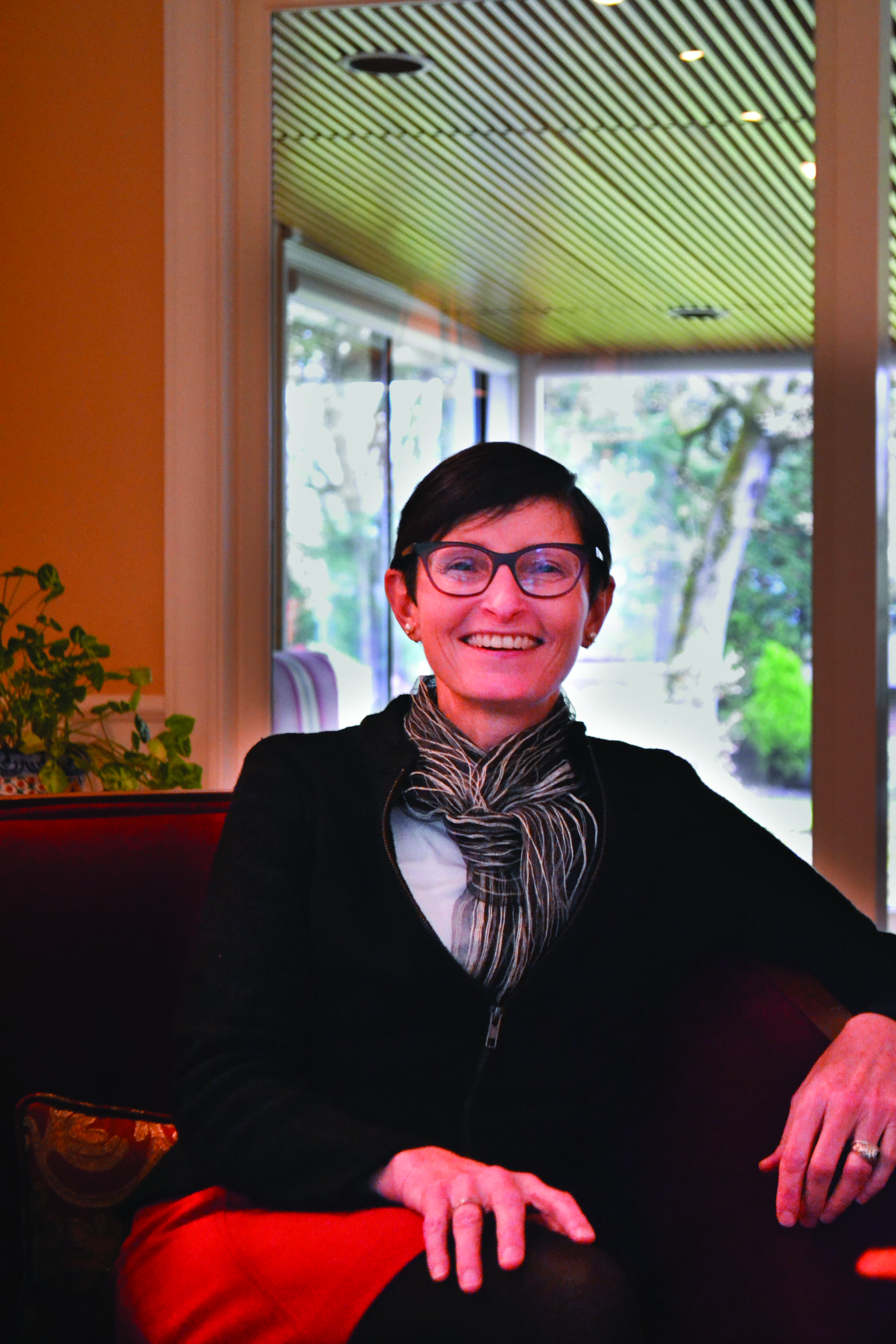
The economy was in a downturn when she graduated with her Master’s of Business Adminstration from Ohio’s Miami University in 1982. She lived at home. She worked as a substitute teacher for first graders up to high school students, a waitress and other odd jobs to make money.
Then, in 1984, she accidentally continued a family tradition. Both her father and grandfather worked for Ford Motor Company in Detroit plants; she followed suit but worked a variety of management positions in the Midwest.
The field was male-dominated. It was quintessentially American: the Midwestern car dealer, the U.S.-made car and all the masculinity that goes with it.
When Patty showed up, the dealers were a little puzzled, but that didn’t stop her.
“They weren’t used to having female sales representatives. It was different for them, especially when going to very remote and rural dealers who were used to dealing with male sales reps. When they’re selling big F-350 pickup trucks, they’d think ‘What’s this woman from Indianapolis going to tell me about how to run my business?’
“Trying to prove to these dealers — who had never had a woman try to help them with their business — I had to go that extra mile. I had to prove to them I knew what I was talking about.”
After briefly leaving Ford for Chicago to establish the dealer network for Nissan Infinti, a luxury car brand, Patty is back as a project manager at Ford Motor Credit, the division of Ford that loans money to the dealers and buyers of its cars.
As of April 2015, she’s running process efficiency projects on a new IT system in China. Her only project is to “make sure China launches successfully.” She runs in between time zones in Shanghai, Ford’s Headquarters in Dearborn, Michigan, and her own here in Tacoma.
She’s up at 6 a.m. for conference calls and has them scheduled through 7 p.m. about three days a week. She travels to Shanghai two or three times a year.
She’s not just a first lady.
In some pre-interview Googling of Patty Krise, I found some surprising numbers attached to her efficiency. She’s worked on more than 10 teams doing Six Sigma projects in the last 10 years at Ford Motor Credit.
“I haven’t kept track, but it’s annual ongoing savings, and $90-100 million is pretty close to what multiple teams have been able to save with Six Sigma.”
Shoot, I hope those dealers listened back in the ‘80s. Clearly, Patty Krise pays attention to detail.
“Oh, you’ll get the hang of it.”
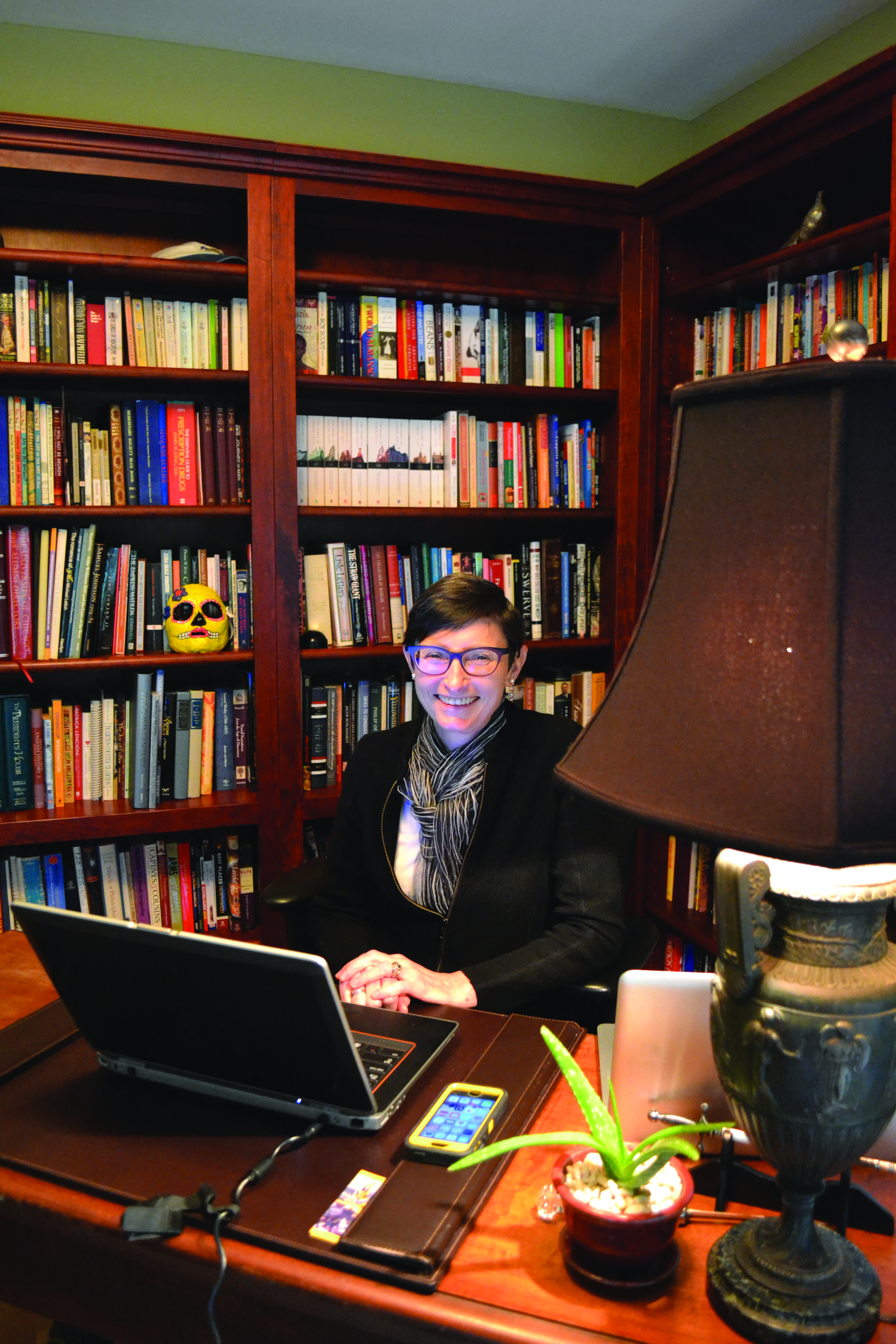 Patty is talking to a young Thomas Krise.
Patty is talking to a young Thomas Krise.
He’s struggling to master some dance steps in the aerobics class they’re both taking in a small health club in Minot, North Dakota, a town that she estimates had a population of 50,000 at the time. Patty is working one of her first sales territories for Ford; Tom is on his first assignment out of the Air Force Academy.
They got to talking after she encouraged him.
“I’m going over to Perkins to meet some friends,” Tom said. “Do you want to go grab a cup of coffee or something like that?”
Patty felt hesitant.
“And so, I’m thinking ‘Gosh, I don’t even know this person,’ you know? ‘I don’t know!’ But I went, and that’s kind of how it all started.”
Patty was commuting every week for Ford from where she lived in Minneapolis, Minn. to her sales territory in Minot. She and Tom continued their relationship this way for six months until she was promoted to the larger sales territory of Fargo, North Dakota. The distance didn’t stop them — they regularly drove about two hours to meet halfway for dinner at one of two restaurants in Devil’s Lake.
In fact, distance has always been a common factor in their relationship. Even before she began making international trips for Ford and Tom became a university president, they found themselves making appearances across the nation and globe.
“I think for the first 10 years we were married, we commuted half of our lives.”
As they carried on their commuter relationship, they tried to make one weekend a month exclusively dedicated to doing something fun together. Patty fondly remembers seeing the musical ”Phantom of the Opera” together in a trip to London two years after they were married.
Cleveland to Washington, D.C., Illinois to Colorado Springs, Shanghai to Tacoma. They’ve made it work for some time — November marked 30 years since Tom proposed in a Minneapolis breakfast joint.
“The important part — and I think it’s still the tradition we have today — is that regardless of where we are in the world, we always talk to one another every day,” Patty says in regards to sustaining their long-term, often long-distance, relationship.
“We’ve made sure we did that all the time. Always keeping those lines of communication open.”
When they’re in the same place, they get up together and eat breakfast before both start busy days — her conference calls, his life on campus.
Patty and Tom still attempt to keep up that work-free weekend tradition, although it often fails — a recent trip to Walla Walla turned out to be a little more “business” when they visited Whitman College.
On some of those weekends and free moments, the two enjoy heading out on their sailboat. It’s a pastime that Patty, who “didn’t grow up on a sailboat,” picked up from Tom.
Otherwise, they spend time together in their almost 5,000 square foot home known as Gonyea House. It’s regal in name and size, yes, but it’s not very threatening when you understand how much the Krises have made it their home.
It’s the only home they own, and it’s largely filled with their furniture. They utilize the whole space, every foot of it the best they can, she explains.
They also watch “House of Cards” on Netflix. She says one of the things they enjoy most is when they get to just make a simple meal at home together. “It’s all about the food,” she says.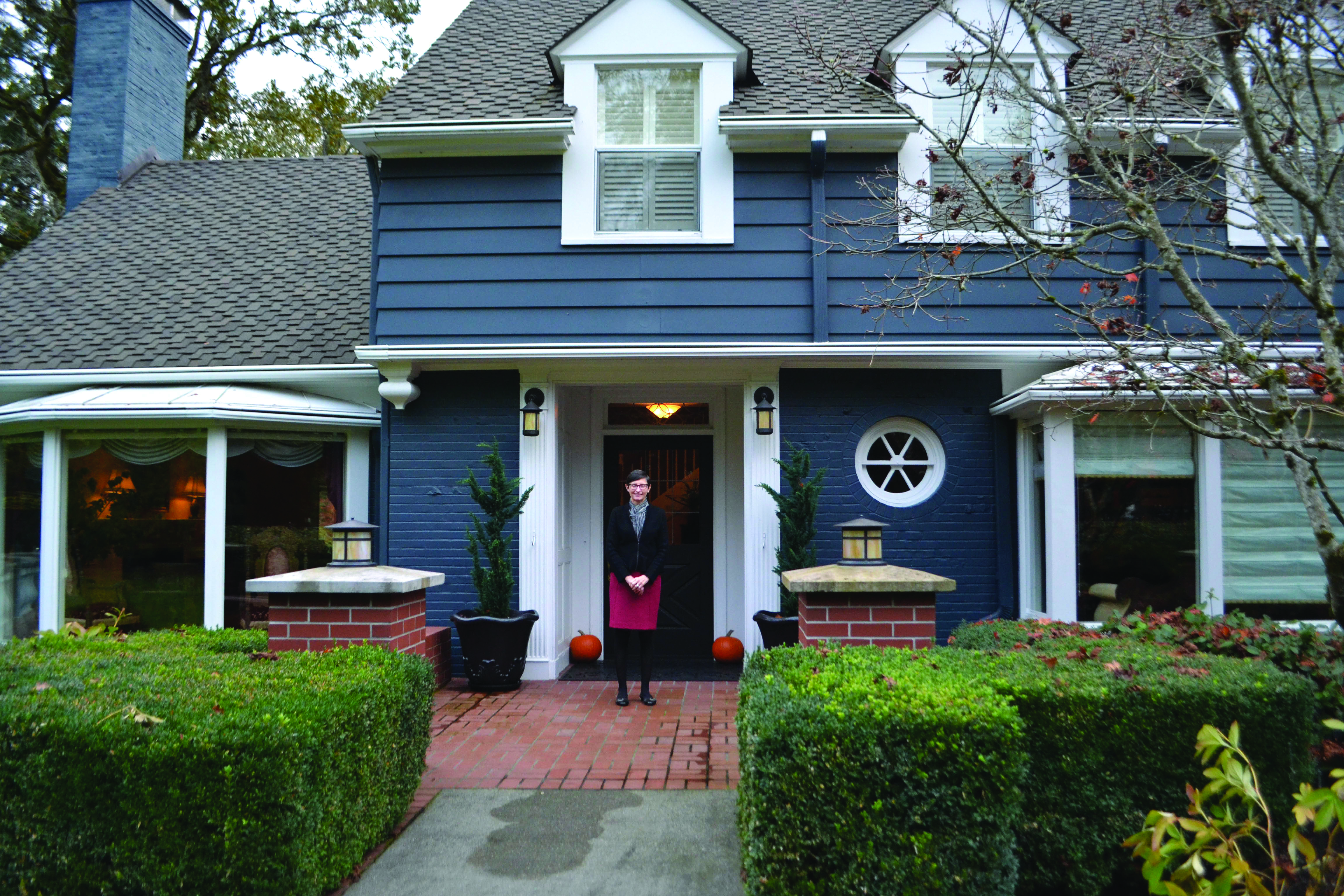
Food is a common symbol of the Krise household. Every first-year class is welcomed into their backyard at the President’s garden party. If an organization wins the biggest prize possible, its members are invited to dinner – like the 2012 Softball team that won the National Championship. International students who can’t make it home for Thanksgiving are invited over for dinner.
Patty says it’s all about the food, and that’s certainly true. But that food, whether chicken on the grill with Tom or a fully-catered meal, is representative of a deep amount of care.
“I was waiting in the UC equivalent where the dining area was,”
Patty says, describing a recent university visit experience she had while waiting for Tom, “and I was just sitting, kind of watching. Even walking, I noticed the students would look down. They wouldn’t look at you, no holding the door, just not that sense of friendliness you get here that I think is very evident when you walk onto campus.”
Patty Krise is a Lute by association. She’s undoubtedly one of us – but she doesn’t work for PLU and she hasn’t studied here.
I think it started right away. I just think that’s the way it is at PLU,” she says, regarding her Lute identity. “Feeling like a Lute, it’s like a big family. They just kind of bring you in and make you a part of their own.”
I’ve always felt a little skeptical about the passion of any university president for his or her university. Even more so when it comes from the spouse.
Patty isn’t paid or employed by the university like her husband. But as we spoke, it only became more clear to me that there was no act. She deeply, truly cared about the university, its mission and its people. But why?
She says staff, faculty and administrators want to be on campus “because it’s a great mission and you’re surrounded by great people.”
“You as students might not see that, but [for] us who have been out of school for a while and in the workforce, we see what great things students are doing and it makes you feel so good. It’s just something you want to support. It’s a privilege to be able to spend time with students who are thoughtful, smart, caring and who want to give back.”
Giving back is what “Lutes do,” Patty says. It seems this is what strikes the closest to her heart.
“You might think that’s common with other schools,” she says. “Having been at other universities, it’s not common.
“PLU has something really different, something that’s really special — that not a lot of other schools have. It’s a great place. More people should know about it.”
We’ve been chatting for more than an hour now, and the sunlight that put glare in her glasses has mostly faded, leaving a clear view to her eyes.
Her voice has softened. The conversation has gone through her business life, her relationship with Tom and ended on care for the PLU community.
It occurs to me that, even though she demonstrates such a deep care for the university and the students who give it life, she doesn’t have explicit forums for interacting with students like her husband does.
“How do you wish more students would interact with you?” I ask.
“Gosh, I’m open to just about anything,” she says. She mentions enjoying when people interact with her tweets at
@pattylkrise. But most of all, she wants students to “feel comfortable just coming up and saying hi.”
“Any advice?” she asks.
I’m not sure how I think campus could interact with her. I wish everyone was able to do what I did: just sit down with her for an hour and talk about life.
“I think students like to know it’s okay to speak to you.”
“Yeah! Tom and I are of that age where we could have students who are in college. We don’t have kids, but we certainly could be parents of kids.”
Her voice, still with the strength of a powerful businesswoman, is a little slower than normal. She appears to truly reflect on her role as a Lute by association — beyond first lady, avid fan and occasional business lecturer.
“I would like them to treat us just like they treat their parents. Because that’s what we are, I guess. We’re surrogate parents, right?”
DON’T MISS: Patty’s Favorite Things!

















